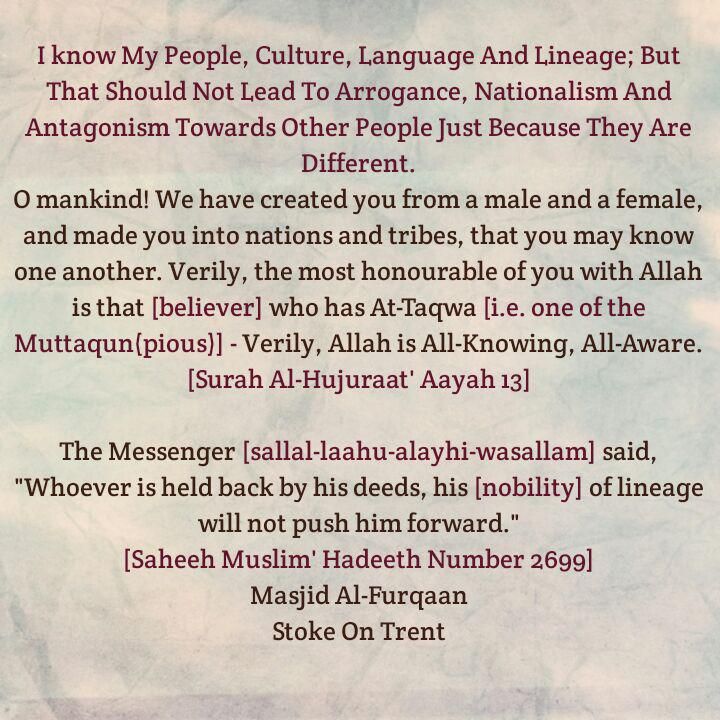I [i.e. all of us] Know My People, Culture, Language And Lineage, But That Should Not Lead to Arrogance, Suspicion or Antagonism Towards Others Just Because They Are Different
In The Name of Allaah, The Most Merciful, The Bestower of Mercy
Shaikh Muhammad Baazmool [may Allaah preserve him] said: Ascription to a tribe is an affair confirmed (or established) by the (Islamic) legislation. [Allaah (The Most High) said]:
يَـٰٓأَيُّہَا ٱلنَّاسُ إِنَّا خَلَقۡنَـٰكُم مِّن ذَكَرٍ۬ وَأُنثَىٰ وَجَعَلۡنَـٰكُمۡ شُعُوبً۬ا وَقَبَآٮِٕلَ لِتَعَارَفُوٓاْۚ إِنَّ أَڪۡرَمَكُمۡ عِندَ ٱللَّهِ أَتۡقَٮٰكُمۡۚ إِنَّ ٱللَّهَ عَلِيمٌ خَبِيرٌ۬
O mankind! We have created you from a male and a female, and made you into nations and tribes, that you may know one another. Verily, the most honourable of you with Allah is that (believer) who has the most Taqwah. Verily, Allah is All-Knowing, All-Aware. [49:13]
Some Benefits derived from the above Ayah:
[لِتَعَارَفُوا – that you may know one another]; so that you may know one another and how close you all are to one another in lineage, but not out of boastfulness. Then Allaah informed us that the most elevated amongst them (i.e the children of Aadam) are those who fear Allaah the most.
The Prophet (salla-laahu-alayhi-wasalam) said: “Learn your lineages so that you can maintain ties of kinship…..’’ [Reported by Imaam Tirmidhee (rahimahullaah) Number 1979 & declared authentic by Imaam Albani (rahimahullaah) in Sahih Sunan At-Tirmidhee]
Therefore, ascription to a tribe and a nation is affirmed in Islaam. The companions of the Prophet [sallal-laahu-alayhi-wasallam] used to ascribe themselves to their tribes and their people in the presence of the Messenger (sallal-laahu-alayhi-wasallam), and he never disapproved of that. [Ref A]
The Messenger [sallal-laahu-aalayhi-wasallam] said, ”Whoever is held back by his deeds, his (nobility) of lineage will not push him forward.” [Ref 1]
Imaam Nawawi [rahimahullaah] said, ”Its meaning is that the one whose deeds are deficient and he does not catch up with the performers of (good) deeds, then it is obligatory upon him not to crown himself with nobility of lineage and the virtues of his forefathers, whilst he is lagging behind in (performing good) deeds.” [Ref 2]
Ubay bin ka’b [radiyallaahu-anhu] said: Two men [mentioned their] lineages during the lifetime of Allaah’s Messenger [sallal-laahu-alayhi-wasallam]; one of them said [to the other]: ‘’I am Fulaan the son of Fulaan [i.e. mentioning his name and that of his parents, grandparents etc.], so who are you [with] no mother? [i.e. rebuking him]. So Allaah’s Messenger [sallal-laahu-alayhi-wasallam] said: “Two men [mentioned their] lineages during the lifetime of Moosaa [alayhis-salaam]; one of them said [to the other]: “I am Fulaan son of Fulaan, until he counted nine [people from his lineage], so who are you [with] no mother” [i.e. rebuking the other]. He [the other person] said: “I am Fulaan the son of Fulaan, the son of Islaam.” So Allaah revealed to Moosaa [alayhis-salaam]: ‘’Indeed those two who [mentioned their] lineages, as for you ascribed or attributed to nine, [they] are in the hell fire and you are the tenth amongst them. And as for you ascribed or attributed to two, [they] are in paradise and you are the third of them.” [3]
Customs
Imaam Ash-Shaatibee [rahimahullaah] stated in Al-Muwaafaqaat that Customs are many different types- some are sound and others are corrupt. The sound customs are those that neither oppose the Sharee’ah texts nor lead to losing an affair deem to be beneficial by the Sharee’ah, nor lead to an affair which the Sharee’ah deems to be corrupt.
As for the corrupt customs, they are those that oppose the evidences in the Sharee’ah or some of the principles of the Sharee’ah, such as some of the customary dealings in usury, and those deeds deemed to be evil by the Sharee’ah which the people engage in during occasions of happiness (or rejoicing etc) [Ref 4]
NB: Whenever we are unsure whether a certain custom of our nation, tribe or clam is permissible or not, we should seek clarification from the people of knowledge.
[Ref A]Source: Silsilah Ar-Rasaa’il Al-Manhajiyyah Fin-Nus’hi Wal Irshaad Wat-Taw’iyah’ pages 47-49 Abridged and slightly paraphrased]
[Ref 1] [Saheeh Muslim…part of hadeeth in ‘’The Book Pertaining to the Remembrance of Allah, Supplication, Repentance and Seeking Forgiveness]
[Ref 2] [Sharh Saheeh Muslim: Hadeeth Number 2699; Vol 17, page 18]
[Ref 3] [Reported by Imaam Ahmad 5/128 and declared authentic by Imaam Al Albaani in As-Saheehah 1270]
[Ref 4]: Al-Muwaafaqaat 2/283. Paraphrased & abridged]
